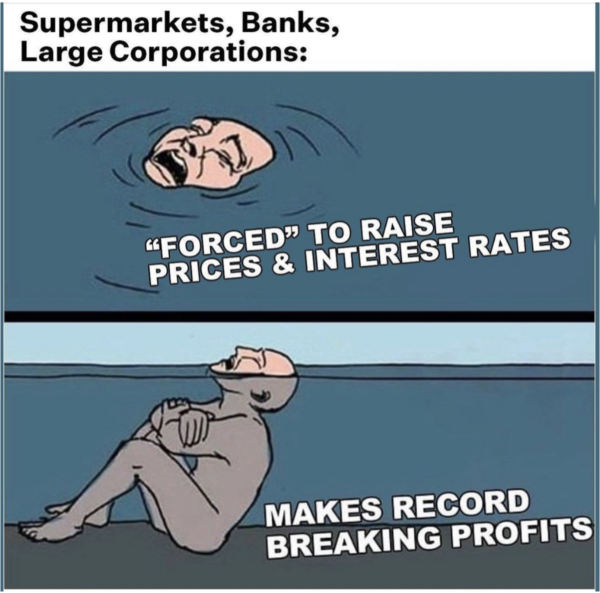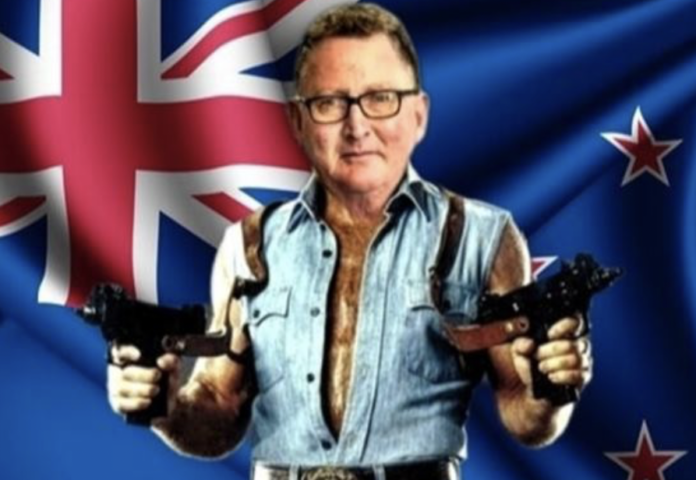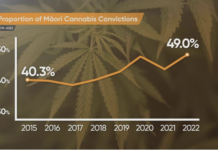As TDB has been banging on for sometime, removing the petrol subsidy was always going to cause inflationary pressures, especially as this coincides with OPEC moves to cut production as the lack of Chinese oil consumption hits demand.
The problem with Orr’s capitulation to the market with his last puny 25 point rise alongside his refusal to allow monetarism to allow the Government to shirk their fiscal responsibilities by claiming inflation has peaked is a big gamble.
The big reason inflation dropped in the last quarter was because of softening petrol prices driven by Biden tapping the strategic reserves plus the true cost of China rapidly reopening after Covid has seen sluggish economic sentiment and a looming debt implosion.
On top of that we have an unprecedented 100 000 migrants arriving plus the damage to our horticultural sector that will send food prices into the stratosphere.
Orr’s bluff to make the Government tax more or spend less by claiming inflation has peaked when it is about to explode again will not win Orr any friends.
Orr isn’t taking into account how trans national corporations are price gouging and generating Greedflation…

…thanks under regulated capitalism!
Note who put that out?
The IMF – hardly a card carrying member of the Communist Party!
The lie the right spin is greedy workers demanding more wages is generating inflation when really it is the greedy transnational corporates!
Greedflation? Research finds some brands are hiking prices higher than inflation, faster than others
Inflation may not be the only factor increasing the price of consumer goods, especially devices, new research by PriceSpy suggests.
PriceSpy tracks the cost of goods over time, showing consumers where to get the lowest prices.
Carl Lindholm, head of public relations for PriceSpy Aotearoa, said while inflation is often blamed for increasing prices, it’s not the only reason.
“We are increasingly seeing competing manufacturers up their prices at differing rates, not only to each other but in comparison to the rate of inflation,” Lindholm said.
Yes! Price gouging behaviour by price maker corporates operating in under-regulated capitalism are driving inflation, not worker wage demands!
NZ business are quick to pretend their price gouging isn’t generating greedflation…
Inflated company profit margins not a major factor in driving up prices in New Zealand – report
Inflated company profit margins, so-called greedflation, have not been a significant factor in driving up consumer prices, according to a new report.
Business NZ – a industry advocacy group – commissioned the report from economic consultancy Sense Partners, which concluded that input costs such as materials have been the major drivers of inflation.
The report said 75 percent of inflation for non-financial businesses over the past three years had been inputs with the balance evenly split between wages and profits.
…really?

…I believe this claim by Corporations that their price gouging isn’t causing inflation is nothing more than PR spin.
First it leaves out the ‘Financial sector’ category of business because – ‘Financial firms require more complex analysis, as the volume of services consumed is not conceptually the same, which is outside the scope of this paper.’ (Under heading 1. Profit-driven inflation approach).
The second major omission is the report ignores the structure/makeup of the New Zealand business environment; it is dominated by franchises, the most obvious are Starbucks/MacDonalds/KFC etc
A third factor is the report uses averages of profit margins from 2017 to 2022 to show pre and post covid profit margins. Averages – there are hundreds of business in New Zealand, many are franchises (I just explained how profits are stripped out), that are lean and hard working. These small businesses have relatively low levels of profitability. There numbers will pull down the average for the few central owner companies who could well be undertaking greedflation but the lack of granularity in this report means we simply can’t see the greedflation on this level of data.
…the issue regarding Greedflation is that price makers who enjoy under regulated market conditions can force us to take any price.
We see this in the Supermarket Duopoly, the Banking Oligopoly and Construction monopolies!

As the brilliant Professor Wayne Hope points out…
Inflation today does not have monetary causes and monetarist solutions cannot work. Edward Miller, economic researcher for FIRST UNION, cites a US Federal Reserve study which debunks the Phillips Curve. Organised labour’s declining bargaining power weakens the relation between unemployment and inflation. Wage-push inflation growth is just not there, so why contract the economy? In New Zealand, between 1991 and 2023, union density declined from over 50 to 20% of the workforce. Clearly, today’s stunted, uneven wage growth is not going to trigger an inflationary surge. Emeritus economics professor Tim Hazeldine proposes a more plausible diagnosis:
It’s COVID inflation that was driven by a supply push from the pricing side of the market. The initial transportation logjams caused by lockdowns gave shippers—especially container shippers—the excuse to drastically hike their prices. In the confusion, many other sellers of many other products discovered that they suddenly had, as one analyst put it, ‘real pricing power’. And boy did they use it!
International research points in the same direction. For US economists Isabella Weber and Evan Wasner, evidence acknowledged by US and European central bankers indicates that “price setting by firms with market power drive inflation”. Giant corporations have the product portfolios, dominant market positions and revenue management systems to maintain margins and customers. With global reach, they are less dependent on any single national market and can shape prices. By contrast, small businesses cannot easily raise prices as costs go up and interest rate repayments increase. Creditworthiness and access to loans will therefore diminish.
Sound familiar? As Tim Hazledine would attest, supermarkets, power companies and banks are pricemakers who drive up inflation while the rest of us struggle. Most obviously, the four largest Australian banks in New Zealand collectively made over NZ$6 billion in 2022. They exploit, ruthlessly, the margins between the interest rates of wholesale money for them and the mortgage rates for captive homeowners.
…Price gouging corporations who have used their under regulated market dominance to milk obscene profits from NZ and are now pretending they aren’t causing Greedflation and that it’s all then workers fault for demanding more wages.
UK just raised their OCR by .5, Australia also raised and the Fed have warned of two more rises.
In NZ, the Reserve Bank Governor is playing chicken with Treasury seeing who will blink first, Monetarism or Fiscal policy.
Month by month the economic house of cards gets more unstable and the rich who have benefited most keep tricking you into believing taxing them isn’t the solution, when it is.

Increasingly having independent opinion in a mainstream media environment which mostly echo one another has become more important than ever, so if you value having an independent voice – please donate here.
If you can’t contribute but want to help, please always feel free to share our blogs on social media





Either way, excellent news!
We need the average punter to feel pain in order to get rid of this government.
Another increase in the official cash rate will be crippling for those already struggling.
Corporate profits shot up into the stratosphere after the central banks started printing currency again, in order for governments to hand out grants to businesses (e.g. the Paycheck Protection Program) and also individuals (the stimulus cheques).
Once the supply of currency (e.g. M2./M3.) started contracting again, profits as a percentage of G.D.P. went into free-fall (now lower than in 2012/13, according to the Fed.).
When Rep. Daniel D. Barnard (Whig, N.Y.) coined the term inflation, he was railing against “an ever-dangerous currency inflation”.
Webster’s Dictionary would thus define inflation as “undue expansion or increase, from over-issue; — said of currency.” (Unabr., 1st. Ed.)
In a research report, the Fed. would describe this as the “astonishing proportion between the amount of paper circulation representing money, and the amount of specie actually in the banks… inflation of the currency makes prices rise.”
How does it make sense to argue that if the price of fuel increases the RB will need to increase the cash rate to stop people from spending more. It sure will have that effect, but increasing one of the two will already send the right signal.
Greedflation is supposed to trickle down to all us peasants.
the intention is to force interest rates up, even though it doesn’t work, poverty for kiwis is their only policy
I hope so.
There’s no point in being stuck in the middle of the tunnel. Go full retard! Hit 10% by Christmas and if there isn’t a nuclear war by then, everything will be kapai.
NZders are a pretty dumb buncha sheep at times. It knows what it doesn’t want, but hasn’t a fuck’n clue about what it does want. And then when a potentially good idea pops up! They poo-poo it because they’re too lazy to think it through. And that’s why we’re stuck in the middle of the tunnel!!
Remember. If the US Democratic Neocons flip the switch in Biden’s little brain. A nuclear Armageddon will kick off and it only takes 400 nukes to obliterate the planet! Between the US & Russia, they have 11,000!!
The problem is the people who vote labour.
Energy costs is a core part of everything in a functioning advanced economy. People are going to get squeezed even harder now the price is up. I agree Orr will have to hike sooner or later.
Oh, and does it strike anyone here as strange that even though crude oil prices are US$70/barrel (half of the all time high), and the New Zealand Dollar is trading at >60c (not especially low) against the US dollar, why fuel prices are at or near all time highs? It’s almost like the issue is refining costs being exported overseas after our wonderful Prime Ministers not only shut down (under Key I think) but dismantled (under the bestest PM evar, Jacinda) our only oil refinery which allowed us to control fuel cost after the commodity price level. Geniuses! All the people involved with this disastrous policy should be held to account.
COAL-TO-LIQUID GASOLINE PRODUCTION
1 barrel oil produced by C.T.L.
= $25-30 USD. cost price
(D.O.E. & C.A.S. estimates)
Cost after refining, gasoline
= $2.00 USD. per U.S. gallon
(TransGas estimate)
Imported gasoline, N.Z. price
= $7.38 USD. per U.S. gallon
1 ton coal = 1.4 barrels oil approx.
N.Z. coal reserve = 16 Bn. tons
= 22.4 Bn. barrels oil
N.Z. oil consumption, p.a.
= 179,000 barrels
Feasibility studies for such a plant in Southland were already undertaken and submitted to the government.
Yes please! I know all about this process BTW (I used to do contract work for SASOL). It would be a great use of both our coal reserves and surplus electricity from the Manapuri hydropower plant (now that the Tiwai Smelter has been shutdown).
the refinary should never have been closed is a given but we still had to pay for crude at international rates and give gouging corporations free reign nitrium